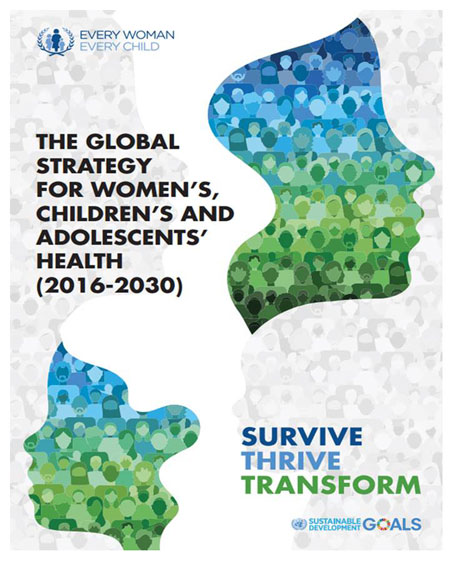UNC named by WHO as lead partner in global effort to save millions of lives
October 1, 2015
 The United Nations’ World Health Organization (WHO) has named the University of North Carolina at Chapel Hill as its academic partner to help coordinate research needed for implementation of a bold new strategy aimed at saving the lives of millions of women, children and adolescents across the world within the next 15 years.
The United Nations’ World Health Organization (WHO) has named the University of North Carolina at Chapel Hill as its academic partner to help coordinate research needed for implementation of a bold new strategy aimed at saving the lives of millions of women, children and adolescents across the world within the next 15 years.
Announced on Sept. 26 at the United Nations General Assembly’s Summit on the Sustainable Development Goals in New York, N.Y., The Secretary General’s Global Strategy for Women’s, Children’s and Adolescents’ Health is a plan to end all preventable deaths of women, children and adolescents by 2030, as well as improve their overall health.
A key part of this announcement included designating the WHO Collaborating Center at UNC-Chapel Hill’s Gillings School of Global Public Health as the academic hub for a major research commitment to the Global Strategy.
“This designation by the WHO recognizes our leadership in implementation science at the University of North Carolina and UNC’s Gillings School of Global Public Health at an international level,” said Barbara K. Rimer, DrPH, dean of the UNC Gillings School. “It also allows us to create new partnerships with institutions across the world and help bring interdisciplinary, innovative solutions aimed at preventing deaths to populations who are so vulnerable and underserved, and do this in ways that are more effective and efficient.”
As the academic hub, UNC becomes the implementation science lead for this initiative, which is led by WHO through its UNDP/UNFPA/UNICEF/WHO/World Bank Special Programme of Research, Development and Research Training in Human Reproduction (HRP). In this capacity, UNC and HRP will coordinate the efforts of HRPs Alliance and the Global Implementation University, with their dozens of affiliated university partners from across the world. Collectively, the university partners will conduct the needed research for assuring that life-saving interventions are implemented successfully and sustainably in the parts of the world where they are needed most.

Herbert Peterson, MD, Kenan Distinguished Professor, Department of Maternal and Child Health, director of UNC’s WHO Collaborating Center
“In essence, we will be coordinating a large-scale academic ‘discovery to delivery’ commitment by universities working with WHO,” said Dr. Herbert B. Peterson, MD, Kenan Distinguished Professor, Department of Maternal and Child Health, who directs the WHO Collaborating Center and will be leading UNC’s efforts for the WHO program. “WHO approached us to lead this effort because of UNC’s reputation as a long-standing leader in translating evidence into public health policies, programs, and practices, and because of our important contributions to the fields of global health and implementation science. With this new role, however, The University of North Carolina will be ideally placed to enhance, harness and apply its implementation science expertise to even greater effect.”
“The WHO Collaborating Center at UNC has been a steadfast supporter of HRP and, given its leadership in implementation science, is ideally suited to play this role” said Dr. Marleen Temmerman, the Director of HRP at WHO.
Peterson and Dean Fixsen, PhD, research professor in the Department of Maternal and Child Health and the UNC Gillings School, are members of the board of directors of the Global Implementation Initiative, which supports the work of the Global Implementation University. Fixsen, current president of the board, will join Peterson in this effort.
“UNC has made key contributions toward the rapidly evolving field of implementation science and this role will enable it to extend the knowledge base while helping to assure the success of this important global health initiative,” Fixen said.
Peterson added that UNC will build strategic partnerships with other universities, including North Carolina State University (NCSU).
“Our collaboration will bring unique strengths to the science of improvement and the science for implementation in service to the most vulnerable populations,” said A. Blanton Godfrey, PhD, professor and former dean NCSU’s School of Textiles.
The UN Secretary General’s Global Strategy for Women’s, Children’s and Adolescents’ Health carries some very specific goals, which include ones to save the lives of mothers around the world. Every country is expected to reduce its maternal mortality ratio by at least two-thirds from the 2010 baseline with a new global target of fewer than 70 deaths per 100,000 live births and with no country having a ratio higher than 140 deaths per 100,000 live births.
“While we already have proven life-saving interventions for preventing deaths to mothers and their newborns, 99 percent of all maternal and newborn deaths now occur in low resource settings where health systems are often unprepared to support the implementation of these interventions,” Peterson says. “Determining what works and what doesn’t work in assuring that innovations reach the intended beneficiaries will be a vital contribution to the Global Strategy. If we achieve these targets, the lives of tens of millions of women, children and adolescents the world over will be saved.”
Share
Gillings School of Global Public Health contact: David Pesci, director of communications, (919) 962-2600 or dpesci@unc.edu
